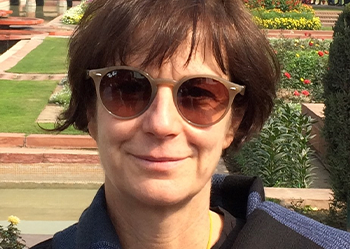University News Last updated 13 February 2024

Professor Valentina Vitali, film historian and Professor in Digital Arts at Birmingham City University (BCU), has been exploring Pakistani and Indian TV series directed by or about women.
There has been a surge of women-centred content in South Asia, both series and films, which circulate globally through streaming platforms. The quality of this content is very high.
After examining a wide range of series, Professor Vitali concludes that, “many Indian and Pakistani series available on streaming platforms focus on women as they do ‘extraordinary’ things. We see women police officers and detectives, high profile journalists, riding a motorbike, or training in boxing and martial arts.”
“But as the camera tends to focus on the women as they do these ‘extraordinary’ things, it often cannot simultaneously convey the women’s point of view. The priority remains showing the women rather than showing viewers things through the women’s eyes. In other words, we are still confronted with what film theorist Laura Mulvey famously called women’s ‘to-be-looked-at-ness’.”
“This is not unique to Indian or Pakistani series and films. Mulvey first wrote about this in the 1970s, but ‘to-be-looked-at-ness’ remains the default mode for women in mainstream cinema all over the world.”
One of the exceptions is Qatil Haseenaon ke Naam / Ode to Femmes Fatales, a series by Meenu Gaur and Farjad Nabi, set in Lahore, Pakistan. The story focuses on women who have been wronged, marginalised, and forgotten, and who decide to seek revenge. It is a very interesting Indo-Pakistani ‘noir’, a genre rarely given to a woman filmmaker to direct in any film industry.
Professor Vitali says: “With this transformative piece of filmmaking, Meenu Gaur proves it’s not only possible to find producers willing to finance content portraying women’s point of view. She shows that a women-centred perspective can be empowering, funny, captivating, and binge-worthy.”
Professor Vitali advises film enthusiasts to exercise their power of choice as viewers. “We have a responsibility to find platforms that show content embracing and foregrounding women’s perspectives. We must not allow algorithms to decide for us and feed us more of the same.”
“Small platforms can’t compete with the advertising might and algorithmic leverage of global corporate players like Amazon Prime or Netflix. It’s up to us to decide where to invest our time.”
Professor Vitali presented her paper Women's voices? South Asian TV series by/about women at the Streaming in the Global South symposium, hosted by the Institute of Asian and Transcultural Studies, Vilnius University, 18-20 January 2024.
Professor Vitali was joined at the international symposium by Frank Mannion, Alan McQueen, and Eugenio Triana, from College of Digital Arts at BCU, who led a special panel on film distribution.
The symposium was part of the South Asian Cinema and VOD Research Network, which brings together scholars, filmmakers, and programmers from Britain, Europe and across South Asia.
The research network and the symposium are funded by an Arts and Humanities Research Council grant led by Professor Valentina Vitali (BCU) and Dr Deimantas Valanciunas (Vilnius University).
The network explore how VODs' operation in film distribution, commissioning, and production is impacting the work of filmmakers in South Asia, and how it shapes representations of regional identity, both within the region and the South Asian diaspora in the UK.
Read more about the South Asian Cinema and VOD Research Network.